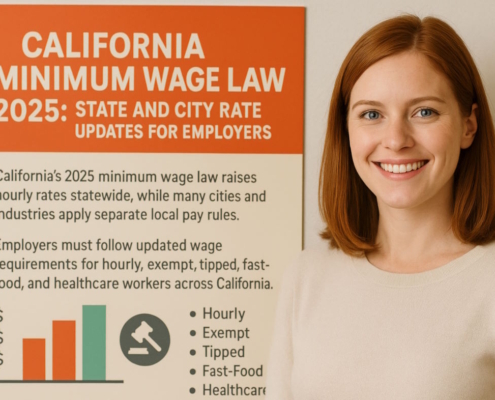California’s Overtime Pay Law
Employers are liable for paying unauthorized overtime, no matter the reason it was worked. Under California overtime law, the basic overtime laws say that a non-exempt worker who is 18 or older, or a 16- or 17-year-old who is not legally required to attend school and isn’t forbidden from the work, cannot work more than eight hours a day or 40 hours a week unless they are paid one-and-a-half times their usual pay for all hours over eight in a day and over 40 in a week.
An employer who requires or permits an employee to work overtime is generally required to pay the employee premium pay for such overtime work. Employees covered by the Fair Labor Standards Act (FLSA) must receive overtime pay for hours worked in excess of 40 in a workweek of at least one and one-half times their regular rates of pay.
California also has unique overtime rules that go beyond federal laws. For example, employees working more than 12 hours in a single day must be paid double their regular pay rate for those hours. These rules ensure workers in California receive extra pay for longer shifts.
Examples of Jobs with Overtime
Some jobs are more likely to involve overtime than others. Workers in healthcare, retail, manufacturing, and delivery often face overtime situations. For example:
- Healthcare Workers: Nurses and doctors might stay extra hours to help patients during emergencies.
- Retail Workers: During busy seasons like holidays, retail employees might work overtime to keep shelves stocked and customers happy.
- Delivery Drivers: With the rise of online shopping, delivery drivers often work overtime to meet tight deadlines.
Understanding how different industries handle overtime helps both employers and workers plan better schedules.
Do Employers Need to Pay for Unapproved Overtime?
The answer is yes. According to California law, overtime must be paid regardless of whether an employee gets advanced authorization to work overtime. Employees are almost always legally owed overtime pay, even if it wasn’t approved. According to §785.11 of the Fair Labor Standards Act (FLSA) regulations, “Work not asked for but allowed is still work time.” Also, §785.13 says, “In all such cases, it is the management’s job to take control and stop the work if they don’t want it done.”
California Labor Commissioner’s advice also says that “an employee cannot purposely stop the employer from knowing about unapproved overtime work and then later demand pay. The employer must have the chance to follow the law.” However, if the employer knows (or should know) that the worker was working from home, they must pay for the overtime.
Why It’s Important to Stop Unapproved Overtime
Unapproved overtime hurts employers in many ways. It takes up your time, costs you money, and lowers team morale—and that’s on a good day. Long periods of overtime work, especially without approval, can harm employees. They might feel worn out, leading to more stress. Over time, this can lower overall efficiency.
Safety problems can also happen. When workers take overtime without telling you, fewer safety measures are in place. If they’re tired or overworked and an accident happens, or someone’s safety is at risk, you could face serious issues.
Steps to Stop Unapproved Overtime
Stopping unapproved overtime takes planning. With the right rules, clear communication, helpful tools, and steady follow-through, unapproved overtime can be avoided.
- Clear Communication: Create and explain clear rules about overtime. Open conversations between workers and their managers can help identify possible overtime problems early.
- Use Technology: Modern tools like time-tracking software can warn when an employee is close to hitting their maximum hours, notifying both the worker and their supervisor.
- Set Overtime Limits: Talk to your team so employees are less likely to take unapproved or accidental overtime. Regularly discussing these limits helps build a culture where workers don’t feel pressured to work extra hours.
- Cross-Train Employees: Avoid relying too much on one group of employees for certain tasks. By teaching workers to handle different jobs, your team can adjust better and avoid overtime.
- Balance Workloads: Uneven tasks can make employees feel forced to take overtime. Spread out tasks fairly to ensure even workloads.
- Create Fair Rules for Overtime: Some employees might think management has favorites for overtime chances. A fair system discourages overtime “hogs” and ensures overtime hours are shared fairly.
Employers should regularly review their overtime policies to make sure they follow the law. Training managers to spot and address overtime early can save time and money. For workers, asking questions about overtime policies can prevent misunderstandings. Both sides need to work together to avoid issues.
Enforcing Rules and Consequences
While employers must pay for unapproved overtime, they are allowed to discipline workers who break company rules. Employers who want to avoid paying for unapproved overtime can actively discourage extra hours by setting, sharing, and enforcing a clear rule.
For example, if an employer finds out a worker worked overtime without permission, they can and should discipline the worker, but they still must pay for the extra hours worked.
Conclusion
Unapproved overtime can strain both a company’s resources and its workers’ well-being. Every employer has a legal and moral duty to pay for all hours worked but can take steps to avoid unapproved overtime. With clear rules, regular communication, and modern tools, businesses can reduce the risks and costs of unapproved overtime while supporting a healthy and productive team.
































